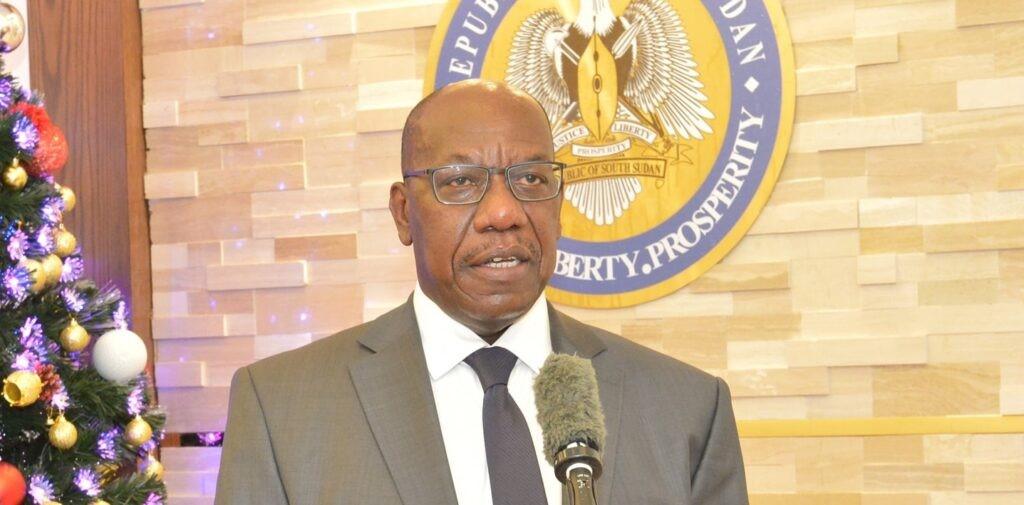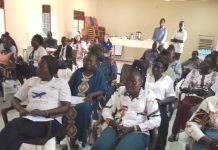Africa-Press – South-Sudan. When you meet him, you will be mesmerised by his warmth and mastery of the language, complemented by the deep voice tucked into his soft-speaking self.
Amb. Maj. Gen. (rtd) Charles Tai Gituai, a Kenyan retired military veteran, has served in the forces for four decades and climbed the ladder of a revered profession. However, contrary to the thinking that servicemen are introverted, mean-looking people with short words, Gituai has the demeanour of a diplomat who handles conversations with ease, and his smile within the sentences tells it all: he is a military man who lives and breathes diplomacy.
When he hosted The City Review at his office along Airport Road in Juba last week, he was reflective on his career as a long-serving peacekeeper and the plight of South Sudan’s peace.
Upon his appointment by the former president of Kenya, Uhuru Kenyatta, and his subsequent confirmation by the IGAD heads of state and government summit meeting on July 14, 2020, as the Interim Chairperson of the Reconstituted Joint Monitoring and Evaluation Commission, (RJMEC), Gituai, 63, began his new journey in playing the role of a monitor, in what appeared to be a politically shaky environment in South Sudan. And, according to his reflection, the world’s youngest nation has only grown stronger in consolidating relative peace.
He says peace remains the greatest milestone thus far.
“We have been able to keep the country on its toes,” he says, adding: “We have achieved permanent peace in this country…Looking forward from 2018, it is much more peaceful than looking backwards from 2018.”
He says the relative peace has opened up various economic avenues in the country. “You are now able to write newspapers in this country.”
Peace deal assessment
RJMEC was formulated under Chapter Seven of the Revitalised Agreement for the Resolution of Conflict in South Sudan (R-ARCSS) to monitor the implementation of the agreement. According to Gituai, the commission has so far noted progress in implementing the key chapters. He cites the graduation of the unified forces as a key milestone that, if completed, would usher the country into a phase of sustainable peace and tranquillity.
“There is a lot that needs to be done, but we have already moved forward. There are only 13,000 pending unified forces to be graduated in Bentiu in Phase One,” he remarks.
“There are plans to begin on Phase II, but there are issues with the management of the forces in the cantonment areas where they are supposed to come with weapons…there is also the deployment of the graduated forces.”
Despite occasional flare-ups of tension between the peace partners as a result of political differences, Gituai believes that President Salva Kiir’s assurance for the umpteenth time is a covenant between the leadership and the people in securing total peace. In addition, he believes that the parties are themselves committed to averting unnecessary bloodshed after a hard lesson learned in the previous wars.
“We are seeing that there is a commitment from the government in place. Recently, the president himself said that he is not going to take the country back to war, and this has been emphasised by other party [members] including the opposition,” he recalls.
“We believe that this is a guarantee that we are not likely to go to war. And, we believe that the leadership has seen the benefit of peace from 2018 until now. They have seen that where there is peace, there is progress,” he adds.
Convinced by the accrued peace dividends, Gituai says the peace partners agreed on an extension for 24 months, popularly known as the roadmap, which RJMEC views as an opportunity to complete all the pending chapters of the agreement and pave way for an election.
“When they brought the roadmap, they thought about three key issues that they found important. There is a need for the reunification of forces, and secondly, the constitution-making process has to be completed. “And the third one is the election itself,” he says, as he argues that the “election is a process, and not an event,”, hence, bound to take time.
Although RJMEC’s boss acknowledges progress in the law-making process pending the formation of the national constitution review commission to pave way for the constitution drafting committee, he emphasises the need to stick to the timelines of the roadmap and get it spot on after the extended period. He is worried that the country could already be trailing in this department.
“There is some delay, I must admit. We have not been able to see what we thought would have happened. “As I am talking to you, according to the roadmap, phase two would have been completed in November,” he laments.
However, President Kiir has blamed the arms embargo for slowing the implementation of the key chapters, such as the one on security arrangements. According to the government, the graduation of the first of the unified forces happened with sticks due to the restrictions. As a result of this issue, which remains the process’s Achilles heel, it now faces the difficult task of deploying forces. But Gituai says that if the agreement is completed, everything will fall into place.
“Resolution 2577 of the UNSC is very clear on what South Sudan is supposed to do to have the arms embargo lifted. “In a nutshell, they are just supposed to implement the agreement,” he says. “You can ask for a waiver on the arms embargo if you state your case, and this could be presented based on the requirements of the roadmap and must be addressed properly to the UN.”
Away from on-the-job discussion, Gituai narrates to The City Review about his experience on the fringes of the limelight, playing pivotal roles in peace missions that have torn him away from the family bond for years. He does not like it but has to live with it.
“It’s been a long road to be able to move after all these years…”Most the time I am separated from the family, and your children are growing without your presence, and some grow big, and they don’t know you well,” he says.
Meanwhile, South Sudan’s peace process remains his focus as he juggles the roles of father, grandfather, and husband.
“We have achieved permanent peace in this country…Looking forward from 2018, it is much more peaceful than looking backwards from 2018.”- Amb. Maj. Gen. (rtd) Charles Gituai
Academic overview
-Master’s Degree in International Studies and Diplomacy, University of Nairobi
-Masters’s Degree in Public Administration and Public Policy (Annamalai University, India).
-Graduate of Defense Services Command and Staff College
-Graduate of Kenya National Defense College
-Post-graduate Dip. in International Law and Diplomacy (Institute of International Law and Diplomacy, India)
Presidential honours
-The Elder of the Burning Spear (EBS)
-Carrier of the Burning Spear (CBS)
Work experience
For More News And Analysis About South-Sudan Follow Africa-Press






